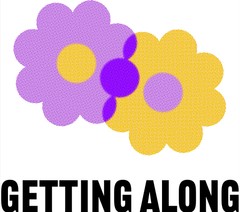Getting Along is a column about taking care of yourself, setting boundaries, and having difficult conversations, for people who struggle with all three.
Advertisement
Wanting to be in a relationship can be tough, even in the best of times; it can feel even more daunting when it seems like you’re the only person who feels that way. If you’re feeling anxious about how you’re going to fare during the alleged (and overhyped, imo!) Bacchanalian era ahead, here are some things to keep in mind. “I think 100 percent of the time, people know what they want from dating,” Maddy Court, author of The Ex-Girlfriend of My Ex-Girlfriend Is My Girlfriend: Advice on Queer Dating, Love, and Friendship, told VICE. “But they're caught up in what their friends are doing, or what they're seeing in movies.” She said it’s important to pay attention to your comfort levels—which can be tough, because it is worthwhile to be open to new experiences and to occasionally challenge yourself. “But at the same time,” she said, “I just hear so many friends and people who write into my advice newsletter who just know, so clearly, that they do not want casual sex. They're not interested in it. And then they just keep trying to do it.”If you’re reading this article, you probably already know on some level that you want to be in a relationship… but it can be hard to fully admit that to yourself, or believe that you’ll be able to find someone, especially at a time when everyone is boldly proclaiming that hedonism is the collective mood. It’s even more difficult once someone who you’re into has told you—either directly or indirectly—that they aren’t looking for anything serious right now.
Be honest with yourself that you want to be in a relationship.
Advertisement
According to Ashley Sivells, a marriage and family therapist in Long Island, people who want to be in a relationship will often pick up on clues that the other person doesn’t feel the same way and think, I don't want to ruin my fun, so I'll settle in order to please the other person and still get what I want, and just hope that it'll turn into a relationship after the summer is over. (When I asked her if this run-out-the-clock strategy ever works, she laughed and said, “Oh, absolutely not. Probably the worst way to go about it.”) So, figure out now how you can keep yourself honest in the future, when you’re tempted to say “sure yeah totally! same!” to the person who can’t seem to commit to weekend plans until the weekend is here, and who tells you that they just got out of something and are really busy with work, so it’s not a great time for them... but still texts you just enough to keep you coming back. Maybe you write down what you want and need in your journal right now so you can easily reference it later, or ask your friends or your therapist to please call you out if they catch you making excuses for someone’s clearly-not-going-to-commit behavior two months from now. If you’re telling yourself (or the New York Post is telling you) that every single person is looking for casual sex with lots of partners and nothing more, it’s a lot harder to feel confident in your needs as you’re meeting new people. But the reality is, there are a lot of people out there who want something more lasting right now. A recent study by the Kinsey Institute found that more than half of single people between the ages of 18 and 45 said they want to find a committed relationship post-pandemic. From the report: “As we emerge in the near future from pandemic restrictions and lockdowns, researchers say it looks like post-pandemic sex will be about taking our time seeking out new relationships and partners, and demanding more and better in the relationships we have.” So let go of the belief that everyone around you is planning orgies, and focus on what you, personally, want—and deserve. You might not find the love you’re looking for immediately, or even this summer, but demanding more, and better, is always worth it.
Let go of the scarcity mindset.
Advertisement
Try not to envision a whole future with someone before really getting to know them.
Advertisement
If you’re prone to worrying about whether people are into you, make sure you’re also considering whether you’re really, truly into them.
Advertisement
Give yourself permission to cut bait after two dates if you’re not really feeling it (or if they’re not really feeling you).
Advertisement
In any case, it might still be helpful to shift your time frame to something that’s a lot shorter than your usual one… especially if, historically, you’ve been known to drag things out. If you do decide to give it a few more dates, try to be specific about what it is you’re unsure about, so you’re not tempted to keep hanging out indefinitely. The simplest—and, perhaps, hardest—way to find what you are looking for when dating is to just be up-front and honest about what you want, and to end things once it’s clear that the other person wants something different. This won’t necessarily look like saying, “I’m looking for a serious relationship” the first night; it’s usually communicated by taking initiative on some well-established actions that imply, “I like hanging out with you and would like to keep hanging out with you.”This might look like regularly talking to/hanging out with them while sober, and attempting to set up actual dates (versus making mostly last-minute, late-night, and/or drunk or high arrangements). It also looks like asking them about themselves, showing genuine interest in the things they tell you, and being enthusiastic and focused on them when you’re hanging out. This behavior doesn’t necessarily scream, “HEY PAL, I’M TRYING TO LOCK THIS DOWN BY THE 4th OF JULY,” but it’s not casual either.
Communicate what you want, both directly and indirectly.
Advertisement
What you’re looking for is also communicated through what you don’t say: You’re going to send the wrong message if you say things like, “I’m just looking to meet people and have fun” or “I just got out of something so I don’t want anything serious” or “I’m not in a good headspace right now.” Basically, make sure that you’re not subtly or overtly sending a message that you’re a chill person with zero feelings when that couldn’t be further from the truth. Ideally, you’ll also say what you want more directly. If they say some version of, “I’m just looking for something casual,” that’s your cue to nicely say, “Ah, that’s good to know—to be honest with you, I’m not, so it probably doesn’t make a ton of sense for us to keep seeing each other.” And then you can finish your drink or your walk or whatever and give them a hug and move on with your life. You may also have to be more proactive about it, and ask them what they are looking for, generally speaking, when it comes to dating. And if their answer is not an enthusiastic and unmistakable version of, “I am looking for a relationship and I also want to keep hanging out with you, personally” and involves a lot of hedging or equivocating, then that’s your cue to nicely say, “Ah, that’s good to know—to be honest with you, I’m looking for something serious, so it probably doesn’t make a ton of sense for us to keep seeing each other.” And then you can finish your drink or your walk or whatever and give them a hug and move on with your life.
Advertisement
This can all feel really loaded, but… it’s not, actually! Wanting something casual isn’t morally or socially superior to wanting to be in a relationship. Try to think of these as two neutral preferences: equally valid, but simply incompatible. This is the point at which I have to mention my problematic fave, He’s Just Not That Into You. The book is from 2004 (and has the gender essentialism to prove it), but the core advice remains true: People who want to be in a relationship with you will act like they want to be in a relationship with you. They will proactively make plans with you. They will be excited to talk to you. They will text you back in a timely manner, and you won’t worry that you’re “bothering” them by reaching out to them. They will laugh at your jokes and take an interest in the things you have to say and generally be nice to you. They will not leave you wondering if they are into you. “I think if someone makes you feel anxious, or you're perpetually in a state of not knowing where you stand, that's probably not a sign that the relationship was meant to go the distance,” Court said. “I’ve really regretted it when I haven't listened to that in the past.I, too, have regretted not listening to this in the past! Personally, I’ve noticed that when I want to be in a healthy, fulfilling relationship, I’m strangely likely to put the bulk of my time and energy into pursuing people who… do not seem to want that at all, at least not with me. Which means they do not have the #1 quality I’m looking for in a partner! Still, though, I often kept hanging on in those instances, telling myself that I didn’t have any other prospects at the moment, so it’s not like I was truly wasting my time, right? But I was wasting my time! Even if I didn’t spend that time trying to meet people I was genuinely excited about, and even if I really, truly had no one else to crush on, I was wasting a ton of time and mental energy I could have spent doing literally anything else. Anything! Truly, folding laundry would have been more affirming. There is something about these messy, confusing quasi-relationships that drag on for far too long that is particularly degrading in a way that no other wastes of time are. “When I've been in a situation in the past—where I feel like someone is stringing me along, or maybe the way I feel about them is flattering for them, but they're not interested in me—I feel like it confirms my own sense of myself as not worth time or attention,” Court said. These experiences chip away at your self-esteem and give you the (incorrect!!!) impression that you’ll never be able to do better than this boring potato with bad politics, who called you hot the first night you met and then never complimented you again. The less time and energy you spend on people like this, the better equipped you’ll be to get with someone hot and nice with good values, who you think is absolutely great and who fully adores you in return. Rachel Miller is the author of The Art of Showing Up: How to Be There for Yourself and Your People. Follow her on Twitter.

